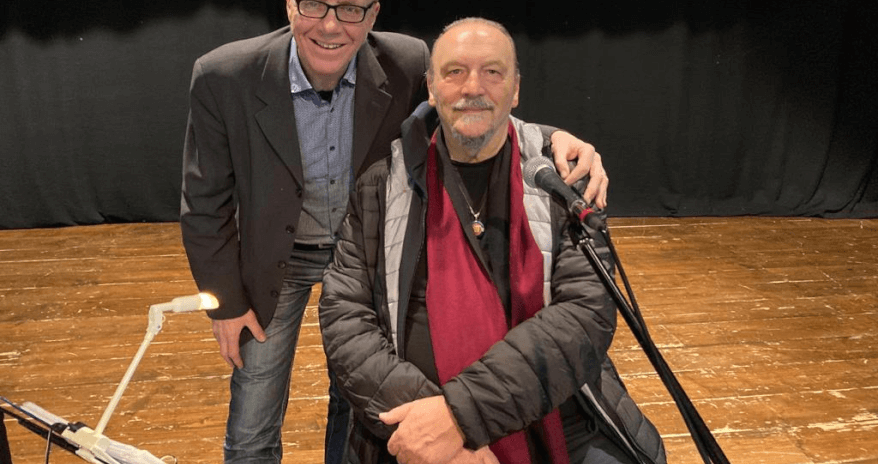On 21 December the “My mystic Christmas – Cristogenesi tour” was staged with Juri Camisasca at the Colonna Theater

Juri Camisasca is an iconic figure in the context of Italian song, with respect to which he certainly represents an anomaly. He has always chosen alternative paths, disdaining easy success to seek a way that would lead him towards the truth of existence, through the art of music or icon painting and spirituality. For this reason, after having released his first album “The window inside” in 1974, for the Bla Bla of Pino Massara with production by Franco Battiato, he decided to leave the world of music, retiring to a Benedictine convent for about ten years, taking simple vows from a friar. Returning to the scene at the end of the 80s, it had a limited production of a few discs but many gems, such as “Nomadi”, “Il sole nella rainfall”, “Visioni”, “Il giorno dell’Indipendenza”, “Open your eyes ”, “Il Carmelo di Echt”, brought to success by his friends Franco Battiato, Alice, Giuni Russo. In particular, he has always had a special bond with Franco Battiato, whom he met during his military service, becoming his friend and collaborator, finally a neighbor in Milo (Ct). To seal this friendship we are left with the song “Torneremo ancora”, the last piece written by Battiato with Juri Camisasca, a piece of a larger project that the two had in mind, which unfortunately remained unrealized due to the disappearance of Franco Battiato. “Torneremo ancora” is also the song with which the Brescia stage of the “My Mystic Christmas-Cristogenesi tour” opens, the first ever concert by Juri Camisasca in Brescia.
On the stage of the Colonna Theater he is joined by three musicians of the highest level: Michele Lobaccaro of Radiodervish on bass, guitar, keyboards and ukulele, Andrea Longo on guitar and the phenomenal violinist Stefano Mecozzi, historic violinist, despite his young age, of Ludovico Einaudi. “Torneremo ancora” takes on a mystical and chanting guise in Camisasca’s version, immediately bringing the atmosphere to contemplative-spiritual dimensions. Juri Camisasca is magnetic, calm, his mellow voice is sometimes cracked by a non-optimal physical condition but these suffering crepolatures give even greater pathos to an evening that the Brescian audience will carry engraved in their hearts. The concert becomes, as anticipated during the presentation by Juri, a “meeting of souls, a journey through sounds and words from different interior spaces and cultures”.
The atmosphere is one of spiritual sharing, the public is in tune with the mysticism of Camisasca and the musicians are like the altar boys in the priest’s court. “Emmanuel”, “Touch the earth, touch God”, “Universal symphonies” and then “Silent Lives”, the song inspired by and dedicated to Etty Hillesum, a Dutch Jew who died in the Auschwitz concentration camp. “When you pray for someone you give him a little of your strength, you lighten his wings”, says the song, included by Blow Up magazine among the 100 best songs of the 2000s. After the beautiful “Nomadi”, a song known in the versions by Battiato and Alice and sung by Juri Camisasca in his 2019 “Laudes”, we have the grace of listening to “The bride” by Giuni Russo, which Juri manages to adapt to his vocal cords, giving a moment of great intensity. Also intense is “Winter” by Fabrizio De Andrè, on the cyclical nature of life. Beautiful “Sanctus”, from the Missa Regia by Henri Du Mont, followed by the immortal “La cura” by Franco Battiato, in a slower and more calm version, with the swinging guitar by Alfredo Longo. The classic Italian Christmas song, indeed Neapolitan, “Quanno nascette ninno” by Alfonso Maria de’ Liguori, saint, bishop and musician, could not be missing, in this song which is the archetype of “Tu scendi dalle stelle”.
“The sun in the rain”, written by Juri for Alice is an important song, here performed in the version for three voices. Closing entrusted to “Israel”, the audience applauds, the voice is increasingly weak but the atmosphere is one of great emotion. The encore is entrusted to one of Camisasca’s best-known pieces, “The Carmel of Echt”, dedicated to Edith Stein, a Dutch Jew like Etty Hillesum, a convert to Christianity, a philosopher, co-patroness of Europe, who also died in the Auschwitz concentration. Juri Camisasca recovers the last shreds of voice to give the public a painful but admirable version, which seems to bring musicians and audience closer to the sufferings endured by the Carmelite nun in Auschwitz. At the end intense applause, greetings, hugs from an audience coming from Florence, Turin, Bergamo, Milan, to which Juri Camisasca gave a performance of rare beauty and spirituality.

